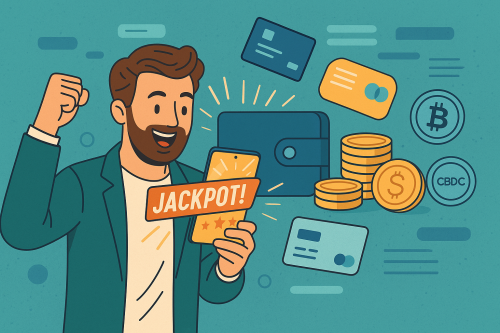What If You Won the Lottery in a Cashless Society?

From Paper Checks to Instant Transfers
Lottery operators across the globe are moving toward fully digital infrastructures. In Finland, Veikkaus, the state-run lottery, phased out anonymous cash payouts over €1,000. Instead, winnings are credited directly to player accounts. In Sweden, the lottery is integrated with BankID, a national electronic identification system. You buy a ticket with your mobile device and receive winnings directly in your linked bank account, often within minutes of the draw.
Even in the United States, some states like Michigan allow players to not only purchase tickets online but also receive direct payouts for smaller wins. For jackpots, players must still complete verification, but wire transfers are quickly replacing the once-ubiquitous oversized check.
The Disappearance of Anonymity
As lotteries go digital, anonymity becomes harder to preserve. In 2018, a woman in New Hampshire sued the state to remain anonymous after winning a $560 million Powerball jackpot. Though she purchased the ticket physically, she had signed it, making it a public record. Now imagine that scenario in a fully digital system tied to your national ID, mobile number, or tax ID. Even trusts or legal entities may no longer shield the identity of the winner.
Some countries, like the U.K., give winners the choice of staying anonymous. Others, like many U.S. states, require full disclosure. But when every transaction is timestamped, logged, and potentially monitored, digital systems make true privacy increasingly elusive.
Taxation Becomes Seamless—and Inevitable
Governments benefit enormously from lottery digitization. Automatic withholding of taxes is easier than ever. In the Philippines, for example, the Bureau of Internal Revenue recently tightened regulations around lotto taxation, ensuring all large prizes are taxed at 20% through bank withholding. In Italy, a 20% tax on winnings is applied instantly when prizes are credited digitally.
With CBDCs on the horizon, the control could become even more granular. If winnings are paid in programmable currency, governments could theoretically limit where, when, or how they’re spent—something that’s already being discussed in trial programs in China and Nigeria.
When Blockchain Makes You a Winner
Blockchain lotteries are also emerging, offering instant, borderless payouts in cryptocurrency. TrueFlip and PoolTogether are examples of decentralized platforms where prize pools are distributed via smart contracts. In one well-publicized 2020 case, an Ethereum-based lottery distributed its winnings to wallets in real time, allowing instant reinvestment or withdrawal.
However, winners must grapple with crypto volatility. In 2021, a player who won 10 BTC (then worth roughly $450,000) in a crypto-lottery found the value halved within weeks during a market crash. Crypto also introduces new risks—forgotten wallet passwords or phishing attacks have resulted in some winners losing access to their full jackpots.
Security: The New Risk of Riches
Instead of being followed home from a lottery office, modern winners face online threats. In India, cybercriminals have increasingly targeted lottery winners with phishing emails designed to steal digital credentials. In countries where lotteries run via mobile apps, like Kenya or South Africa, malware targeting mobile banking has become a growing concern.
Protecting your fortune no longer means hiring bodyguards—it means using hardware wallets, strong passwords, and multi-factor authentication.
Cashless Realities Already Exist
In Denmark, lottery winnings above a threshold are exclusively paid into bank accounts. In Australia, winners of the digital lottery operator The Lott must verify their identity through a secure app and accept winnings as direct deposits. Japan’s lottery also began phasing out large cash payouts, citing both security and efficiency.
In Norway, the national lottery blocks anonymous play entirely. Players must register with a government ID, and winnings over a certain threshold are automatically taxed and credited. As a result, there’s no scenario where a player can walk away anonymously with a bag of cash—it’s digital or nothing.
Emotion Versus Efficiency
Something is undeniably lost when lottery wins become digital. That moment of walking into a store, physically handing over a ticket, and receiving stacks of cash is being replaced by quiet text messages or app push notifications. Some might argue it’s more secure; others would say it’s anticlimactic.
But as the world transitions to digital-first economies, this may be the only practical future for national lotteries. Whether you’re receiving your winnings via crypto wallet, mobile banking app, or CBDC account, the thrill of winning may stay the same—though the delivery feels different.
Tomorrow’s Jackpots Are Still Real
Despite the decline of physical cash, the allure of sudden wealth endures. Whether a jackpot is paid in dollars, tokens, or euros, it still represents a life-changing opportunity. The key difference is how seamlessly it will be delivered—and how carefully it will be tracked. In a cashless society, you may never touch your winnings—but they’ll touch every corner of your life.

Marry Levental is a writer and content contributor at LotteryPros with a genuine passion for both lotteries and storytelling. Known for her energetic writing style and attention to player concerns, Marry covers everything from platform reviews to industry news with clarity and heart. She brings a balanced perspective to her articles, always aiming to help readers make informed, confident decisions. Her enthusiasm for the lottery world is evident in every piece she writes.